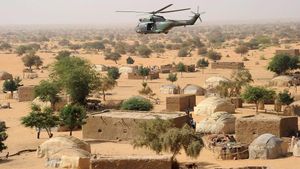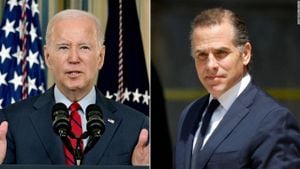Taiwan’s President Lai Ching-te recently embarked on his first overseas trip since taking office, commencing with a significant two-day stopover in Hawaii as part of his broader Pacific island tour. This tour is aimed at reinforcing Taiwan’s diplomatic ties with its remaining allies, which include the Marshall Islands, Tuvalu, and Palau— all of which maintain formal relationships with the island nation amid increasing pressure from China.
Upon his arrival at Daniel K. International Airport, President Lai was warmly welcomed by Hawaii's Governor Josh Green, along with other local officials. During his time there, the discussions revolved around disaster preparedness and leveraging past experiences as healthcare professionals to improve governance strategies. Lai, who holds a Master of Public Health degree from Harvard, expressed his commitment to using shared values of democracy, peace, and prosperity to solidify cooperation with Taiwan’s allies.
The visit, which was met with accolades from local leaders and packed events, was not without controversy; it sparked strong reactions from Beijing. The Chinese government, perceiving Lai’s engagements as moves toward “separatism,” issued vehement condemnations against both the visit and recent U.S. military arms sales to Taiwan. These sales, totaling $385 million, involve spare parts for Taiwan’s F-16s and additional tactical communication support, highlighting the military relationship between the U.S. and Taiwan.
“China will closely monitor the situation’s development and take resolute and forceful measures to safeguard the country’s sovereignty,” stated China’s Foreign Ministry shortly after Lai’s visit was announced. Since the U.S. switched recognition from Taipei to Beijing back in 1979, Beijing has been particularly sensitive to any formal exchanges between the U.S. and Taiwan, viewing them as threats to its sovereignty claims over the self-governing island.
During his visit, President Lai also paid homage at the USS Arizona Memorial—signifying both resilience and remembrance linked to peace. Reflecting on the precarious situation Taiwan faces, he stated, “Peace is priceless, and war has no winners; we have to fight together to prevent war.” This poignant message resonates deeply, especially as Taiwan navigates its position amid increasing military drills and rhetoric from China following Lai’s previous U.S. transit as Taiwan’s vice president.
Lai's burgeoning relationship with local American officials aims to amplify ties through cultural and historical recognition. His trip involved showcasing mutual values with U.S. officials, which Lai described as key to fostering stronger, more resilient systems to handle natural disasters—something Taiwan has excelled at, considering its geological challenges.
The evening also featured social engagements, including photos with congressional representatives and leaders from the Taiwanese American community at a banquet. U.S. Representative Ed Case emphasized the enduring ties rooted in mutual values and interests as he addressed the Taiwanese community present. His comments underscored the underlying theme of collaboration between the U.S. and Taiwan during this visit.
Despite the jubilation surrounding Lai’s formal welcome and engagements, uncertainty lies about potential meetings with senior U.S. officials during his transit. The incoming political climate under President-elect Donald Trump may also bring new challenges to U.S.-Taiwan relations—especially as Trump has previously remarked on Taiwan’s responsibility for its own defense. This unpredictability adds another layer of complexity to Taiwan's fragile diplomatic stance amid rising tensions with China.
Overall, Lai’s tour will see him venture beyond Hawaii, with planned visits to Tuvalu, Marshall Islands, and Palau, all situated within the Pacific region. Collectively, these nations represent Taiwan’s continued struggle to maintain its diplomatic presence globally, defying Beijing’s aggressive posture against any international recognition of Taiwanese sovereignty.
With Lai’s tour generating headlines and mixed diplomacy opinions, it remains to be seen how this will influence the geopolitical dynamics within the Pacific and the broader relationship between the U.S. and China. His capacity to uphold Taiwan’s relationships with its allies may set the stage for future dialogues surrounding peace and stability against the backdrop of mounting national tensions.



